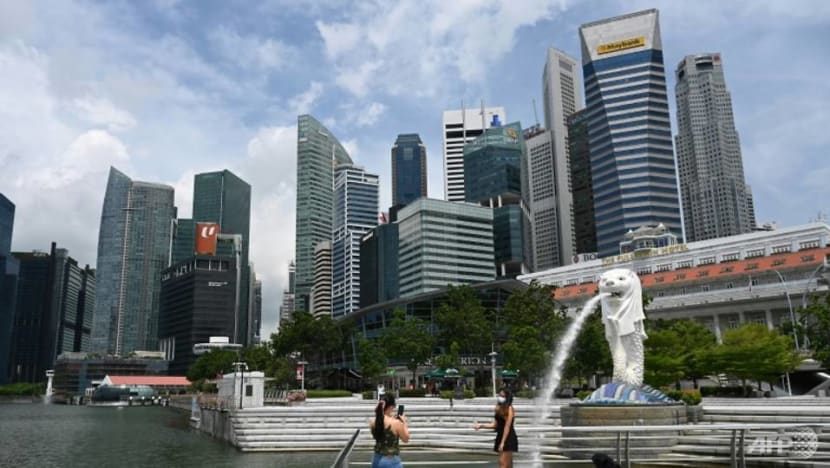What the G7’s global tax reform plan could mean for Singapore

A view of the Singapore skyline from Merlion Park. (File photo: AFP/Roslan Rahman)
SINGAPORE: The recent landmark accord among the Group of Seven (G7) nations for new tax rules aimed at large multinational corporations (MNCs) could see a reduction in the tax advantage that Singapore offers to these businesses, said experts.
But it remains too early to tell how this will impact companies’ investment decisions and Singapore’s attractiveness as a regional and global business hub, they added.
WHAT THE DEAL IS ABOUT
Finance ministers from the G7 advanced economies agreed on Jun 5 to back the creation of a global minimum corporate tax rate of at least 15 per cent.
They also agreed on allowing countries where an MNC’s customers are based to be “awarded taxing rights of 20 per cent profit exceeding a 10 per cent margin”, regardless of whether the MNC has physical presence in these markets.
READ: What is a global minimum tax and what will it mean?
This hopes to end what United States’ Treasury Secretary Janet Yellen called a “race to the bottom” where countries have competed to lure corporate giants with ultra-low corporate tax rates and exemptions.
Current global tax rules, which date back to the 1920s, have also been struggling with the rise of technology giants that sell services remotely and attribute much of their profits to intellectual property held in low-tax jurisdictions.
The G7 accord comes as no surprise, tax experts told CNA, given that negotiations have been coordinated by the Organization for Economic Cooperation and Development (OECD) for years on rules for taxing cross-border digital services and curbing tax base erosion.
But this is not yet a done deal.
It remains to be seen if the proposals can garner support from the world’s top developed and developing countries at the Group of Twenty (G20) meeting in Venice next month, as well as more than 130 countries under the OECD Inclusive Framework.
G20 member China is among countries that have voiced objections to a global minimum corporate tax rate, Reuters reported on Jun 10 citing people familiar with the negotiations.
READ: Indonesia, South Africa, Mexico back G7 global tax reform proposal
Given the complexities of multilateral negotiations, it may take “several years” before the new rules are implemented, said PwC Singapore’s tax leader Chris Woo.
“The entire process will likely take some time, from discussions on the technical design features, achieving political consensus, to putting in place domestic legislation and multilateral instruments to give legal effect to these rules,” he added.
Singapore’s Finance Minister Lawrence Wong has said it remains “too early to say” how the G7’s deal could impact Singapore, but as and when a global consensus is reached, the authorities “will make any necessary changes” to the country’s corporate tax system.
“We will continue to ensure that our tax system is compatible with international norms, while managing the administrative and compliance burden on businesses,” he said in a Facebook post earlier this month.
Mr Wong also stressed that Singapore’s competitiveness “has never been based on taxation alone”.
“Trust, reliability and integrity are ultimately what makes Singapore an attractive place for substantial economic activities,” he wrote.
READ: Singapore will ensure its tax system is compatible with international norms while managing burden on businesses: Lawrence Wong
“NEUTRALISE” ANY TAX ADVANTAGE
Currently, Singapore’s headline corporate tax rate is at 17 per cent but the effective tax rate of many businesses may be lower than that, or even the proposed global minimum of 15 per cent, due to tax incentives awarded to those seen as beneficial to the country’s economic development.
With the proposal of a global minimum rate, “the consequence of a low effective tax rate for MNCs in a particular jurisdiction is the triggering of a ‘top-up tax’ in the jurisdiction of its ultimate parent entity,” said Mr Dean Rolfe, KPMG’s partner and head of international tax for Asia-Pacific.
“In view that many international businesses see Singapore as an efficient gateway into Asia, multinationals will be weighing the impact of the global minimum tax against the efficiency and convenience of operating from Singapore to manage their regional business,” he added.
Mr Chester Wee, EY Asean international corporate tax advisory leader, said: “Basically, the global minimum tax proposal will neutralise any tax advantage that an MNC may secure from Singapore.”
In addition, the other proposed measure to allow countries where customers are based to tax a greater share of a MNC’s profits may also mean “a reduction in the tax base for Singapore”, he added.
“Given Singapore’s centrally located geographical position, large MNEs (multinational enterprises) have set up hubs in Singapore to sell goods and services into Asia-Pacific. With this profit re-allocation rule, part of the profits from such hub operations may be re-allocated to the market jurisdictions,” he said.
That said, there might be a near-term boost.
PwC's Mr Woo reckoned that Singapore “could potentially gain more corporate tax revenue if tax incentives are withdrawn” from the relevant companies once the global minimum corporate tax rate kicks in.
TOO EARLY TO PREDICT IMPACT ON INVESTMENTS, ECONOMY
Mr Wee said these reforms in global tax rules are “creating uncertainty which may cause delays in investment decisions”.
Those with a presence in Singapore and which are affected by the new proposed rules “can certainly be expected to re-assess their investments if Singapore’s tax incentives no longer present a benefit due to the ‘top-up’ of taxes,” said Mr Woo.
But there might not be a “uniform response across the board” as certain investments such as those in the technology space, “are more mobile than others”, he added.
“Big tech can move more easily compared to manufacturing but even then, it depends on availability of a skilled workforce. Others who are seeking to apply other strategies such as the diversification of supply chains or require proximity to markets may be less inclined to move.
What companies that can afford to move will be considering is the non-tax benefits of operating in Singapore and whether other measures will be doled out to attract them to remain in Singapore, said Mr Woo.
But while there is the risk, experts told CNA that Singapore’s long-term attractiveness to MNCs around the world is unlikely to be dampened based on taxation changes alone.
CIMB Private Bank economist Song Seng Wun said: “Singapore isn’t an idyllic island under the sun where nothing goes on. Real economic activities are taking place here, with businesses setting up offices and factories because it is attractive for them to do so.
“And not because the tax incentives are attractive - if it was just that, anyone can out-incentivise us.”
Singapore's infrastructure, rule of law, stable political environment, as well as connectivity to regional and global economies are among the “intangibles that companies also consider beyond the dollar and cents”, he added.
“Because we know that businesses are in in Singapore more than just tax reasons, as long as Singapore’s overall package remains attractive, (the new tax rules are) not a significant issue at the moment.”
Echoing that, KPMG Singapore’s partner and head of tax Ajay Kumar Sanganeria said “it is too early to predict overall outcomes” but Singapore will remain a relevant regional hub due to benefits such as the availability of highly-trained talents, strong protection of intellectual property and its reputation as a global financial hub.
That said, the cost of doing business remains a concern for companies. To continue attracting MNCs, Singapore may need to enhance support for innovation, training or other value-added activities, he added.
Mr Rolfe also mentioned that there is “a very large pool” of MNCs that will not be impacted by the proposed global minimum rate and these MNCs will continue to be attracted to Singapore.
More importantly, the tax reforms do not apply to small and medium-sized enterprises (SMEs) as they fall beneath the expected threshold.
“SMEs represent the majority of economic activity in many jurisdictions and their taxation situation will not change under these proposed rules,” said the KPMG tax expert.
“In summary, it is too early to identify the financial impact on Singapore,” he said.












